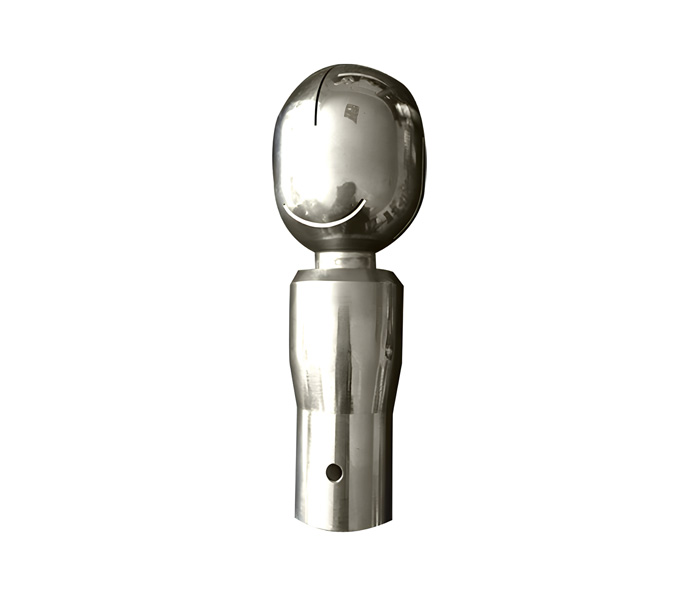
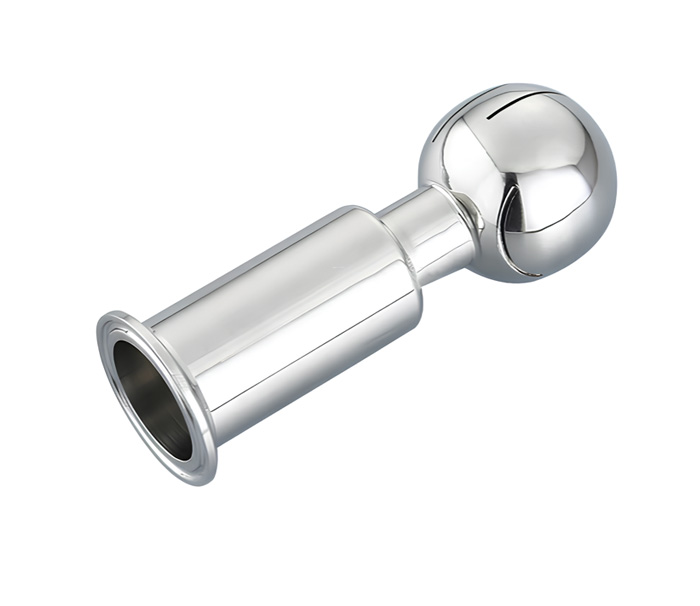
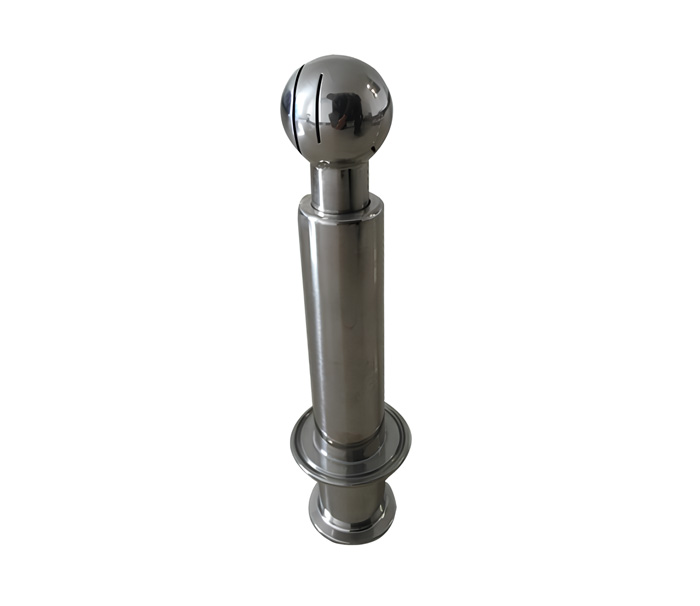
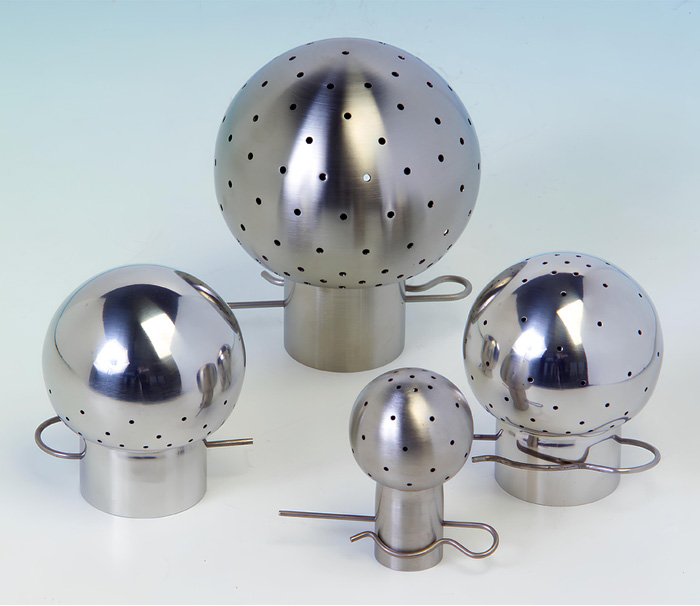
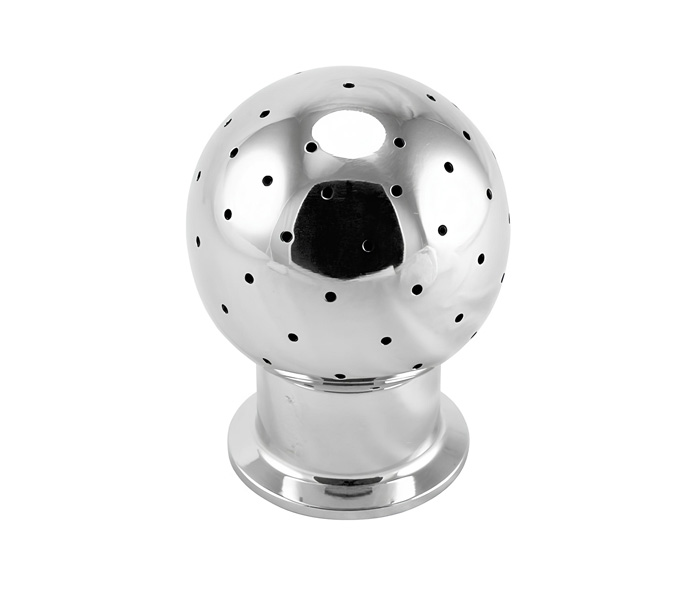
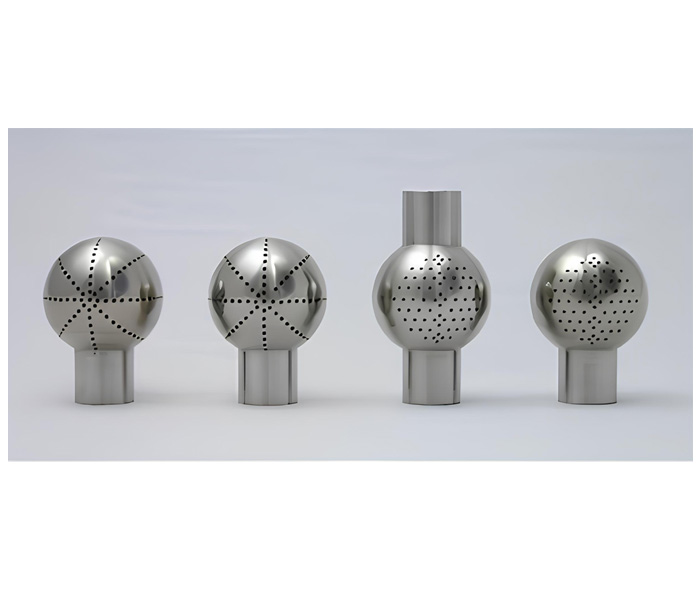
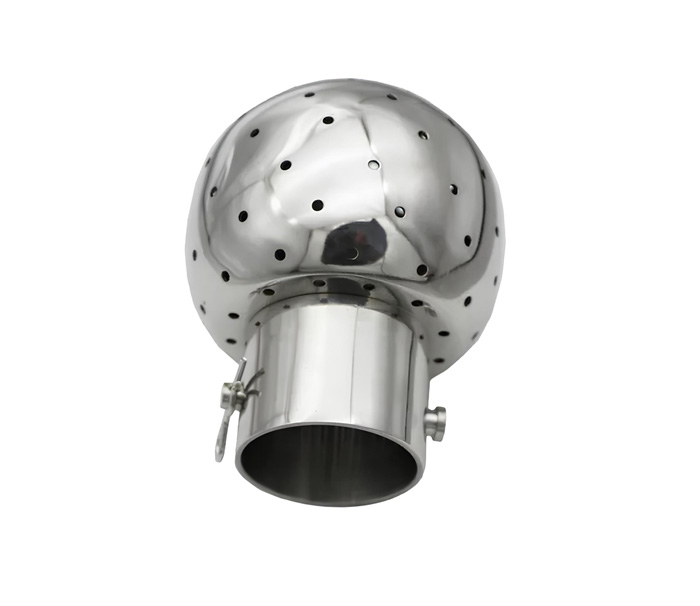
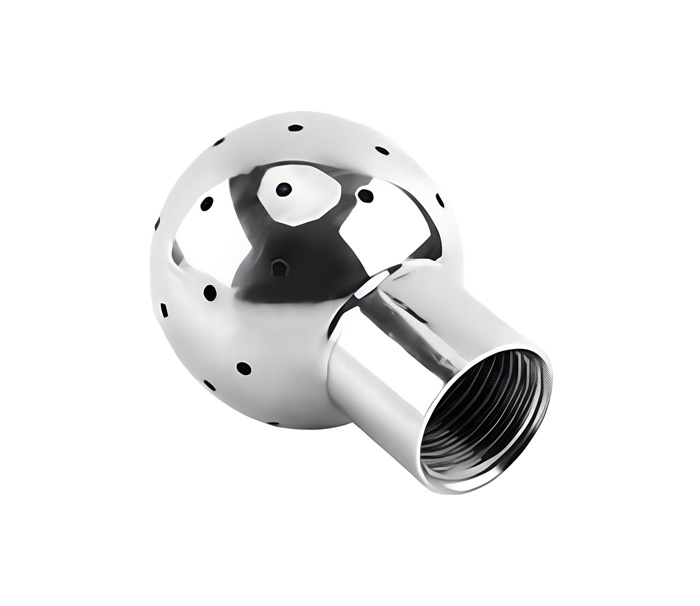
What are Spray Balls?
Spray balls are devices designed for the cleaning and sanitation of tanks, vessels, and other equipment in industrial processes. They are commonly used in industries such as food and beverage, pharmaceuticals, and chemicals where maintaining cleanliness and hygiene is critical. The primary purpose of spray balls is to distribute cleaning fluids, such as water or cleaning solutions, evenly across the interior surfaces of tanks to remove residues, contaminants, and other unwanted materials.
Product Data
The Spray Ball by Arrotop is a high-performance cleaning device designed for efficient tank and vessel cleaning across various industries. It delivers powerful, thorough cleaning action, ensuring complete coverage and effective removal of residues and contaminants from tank walls and surfaces.
Spray balls serve as primary elements for cleaning tanks and vessels, including storage tanks, CIP tanks, and milk collecting trucks. These devices come in various sizes, flow rates, and configurations to accommodate a wide range of cleaning tasks. Functioning as static cleaners, spray balls are specifically crafted for efficient flush cleaning with a high flow rate, ensuring robust flushing capabilities at low pressure.
Features
- Effective Cleaning: Provides comprehensive spray coverage, ensuring thorough cleaning of all internal surfaces.
- Versatile Use: Suitable for use in Cleaning-in-Place (CIP) systems, ideal for applications in the food and beverage, pharmaceutical, and chemical industries.
- Easy Installation and Maintenance: Simple to install and maintain, reducing downtime and increasing operational efficiency.
- Customizable Patterns: Available in various drill patterns and sizes to fit different cleaning needs.
- Material Options: Constructed from high-quality materials like stainless steel and alloy steel for durability and reliability.
Benefits
- Comprehensive Cleaning: Delivers effective cleaning performance with various spray patterns.
- Durability: Constructed from high-quality materials to ensure long-lasting performance even in challenging environments.
- Reduced Downtime: Easy to install and maintain, minimizing downtime and improving productivity.
- Enhanced Efficiency: Optimized spray patterns ensure efficient cleaning, reducing water and chemical usage.
Materials
- Stainless Steel 304/L, Stainless Steel 316/L, Alloy Steel, Other materials available on request
Model Numbers
- ARO-SB-304-001: Stainless Steel 304/L
- ARO-SB-316-002: Stainless Steel 316/L
- ARO-SB-AS-003: Alloy Steel
- ARO-SB-OMR-004: Other Materials on Request
Specifications
- Drill Patterns: Spray ball drill patterns depend on placement, surface area coverage requirements, and obstructions, with options ranging from 90- to 360-degree coverage.
- Ball Diameter: Typically range from 1.25″ to 4″
- Connection Size: Varies from 0.5″ to 2.5″, determining the maximum flow delivered through a spray ball.
- Connection Style: Includes slip collar, butt weld, flare (no connection), tri-clamp, half coupling, and pipe nipple.
- Flow (gpm): A minimum flow rate of 3 gpm for every foot of tank circumference is required.
- Pressure (psi): Standard design flow rate is 25 psi, with a maximum pressure for custom spray balls up to 70 psi.
Applications of Spray Balls
- Food and Beverage Processing: Spray balls are extensively used in the food and beverage industry for cleaning tanks, fermenters, storage vessels, and processing equipment such as mixers, blenders, and pasteurizers. They help maintain hygienic conditions and prevent contamination by effectively removing residues, bacteria, and other contaminants.
- Pharmaceutical Manufacturing: In pharmaceutical production facilities, spray balls are employed for cleaning process vessels, reactors, mixing tanks, and piping systems used in the production of drugs, vaccines, and other pharmaceutical products. They ensure compliance with stringent regulatory requirements for cleanliness and sanitation.
- Brewing and Distilling: Spray balls are essential for cleaning fermentation tanks, mash tuns, lauter tuns, and other equipment used in brewing beer and distilling spirits. They help remove yeast, hops, and other residues to prevent off-flavors and maintain product quality.
- Dairy Processing: Spray balls are used in dairy processing plants for cleaning milk storage tanks, cheese vats, butter churns, and other equipment involved in milk processing and cheese making. They facilitate efficient cleaning and sanitization to meet food safety standards.
- Cosmetics and Personal Care: In cosmetic and personal care manufacturing, spray balls are utilized for cleaning mixing vessels, blending tanks, and filling equipment used in the production of lotions, creams, shampoos, and other personal care products. They ensure product purity and prevent cross-contamination.
- Chemical Processing: Spray balls find applications in chemical processing plants for cleaning reactors, storage tanks, and piping systems used in the production of specialty chemicals, adhesives, coatings, and other chemical products. They help prevent product contamination and maintain process efficiency.
- Biotechnology and Pharmaceuticals: In biotechnology facilities, spray balls are employed for cleaning bioreactors, fermenters, and other equipment used in the cultivation of cells, bacteria, and other microorganisms for biopharmaceutical production. They ensure sterility and product quality in bioprocessing operations.
- Water Treatment: Spray balls are used in water treatment facilities for cleaning sedimentation tanks, filtration systems, and other equipment used in the treatment of drinking water, wastewater, and industrial process water. They help remove solids, biofilms, and other contaminants to maintain water quality and system performance.
Advantages of Spray Balls
- Uniform Cleaning: Spray balls are designed to distribute cleaning fluids evenly across the interior surfaces of tanks and vessels. This ensures uniform cleaning, preventing the buildup of residues, contaminants, and microorganisms.
- Efficient Cleaning: The strategic placement of nozzles on spray balls, along with their ability to provide a controlled and directed flow of cleaning fluid, contributes to efficient cleaning. This is particularly important in industries where cleanliness is crucial for product quality and safety.
- Versatility: Spray balls can handle a variety of cleaning fluids, including water, detergents, sanitizers, and specialized cleaning solutions. This versatility allows for the adaptation of the cleaning process to specific industry requirements.
- Compatibility with Different Tank Sizes: Spray balls come in various sizes and configurations, making them suitable for different tank and vessel sizes. This adaptability ensures that the cleaning system can be tailored to the specific needs of the equipment.
- Static and Dynamic Options: The availability of both static and dynamic spray balls provides flexibility in cleaning approaches. Static spray balls are suitable for stationary cleaning, while dynamic ones, which can rotate, enhance coverage and effectiveness, especially in larger vessels.
- Ease of Installation: Spray balls are typically easy to install in tanks and vessels. They can be fixed in a stationary position or attached to rotating devices, depending on the specific cleaning requirements of the equipment.
- Reduced Manual Labor: The automated nature of spray ball systems reduces the need for manual cleaning efforts. This not only saves labor costs but also minimizes the risk of human error in cleaning processes.
- Cost-Effective: Spray balls contribute to cost-effectiveness by facilitating efficient cleaning processes, reducing the downtime required for manual cleaning, and ensuring that equipment remains in optimal condition for longer periods.
- Compliance with Hygiene Standards: In industries such as food and beverage, pharmaceuticals, and cosmetics, where strict hygiene standards must be maintained, the use of spray balls helps ensure compliance with regulatory requirements.
- Prevention of Cross-Contamination: Effective cleaning with spray balls helps prevent cross-contamination between batches in processing equipment, maintaining product quality and safety.
- Corrosion Resistance: Many spray balls are constructed from corrosion-resistant materials, such as stainless steel, ensuring durability and longevity even in harsh industrial environments.
